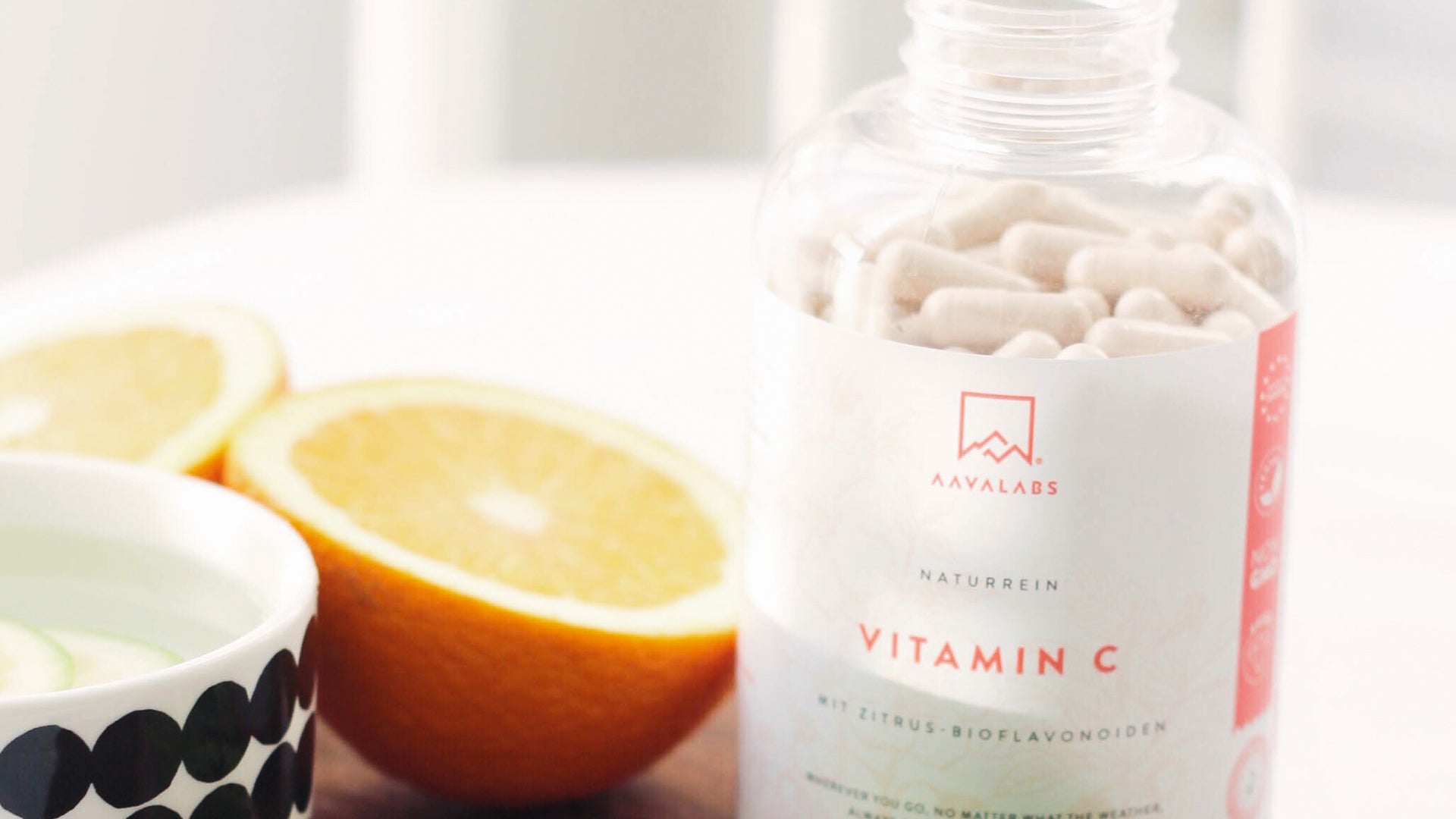
How to Avoid a Vitamin D Deficiency
Vitamin D, also known as the sunshine vitamin, is essential for our health. The name is no coincidence: it is the only vitamin whose supply is not mainly provided by food, but by the sun. And this is exactly where the problem lies. Especially in the dark winter months, a vitamin D deficiency can easily occur in our latitudes. If there is little sunlight during the day and we spend most of our time indoors, the body's vitamin D production automatically declines.
In this blog post, we explain how to recognise a deficiency, what causes it, and how you can easily correct a deficiency with vitamin D supplements.
Identifying Vitamin D Deficiency
According to national surveys in the UK, across the population approximately 1 in 5 people have low vitamin D levels. Other estimates suggest that about 1 billion people worldwide have vitamin D deficiency.
There are several indications that can point to a vitamin D deficiency:
- Tiredness and fatigue
- Weakened immune system
- Bone pains (often in the legs)
- Weak, declining performance
- Periodontitis
- Muscular weakness
Many people are not even aware that symptoms such as fatigue could be due to a vitamin D deficiency. Vitamin D can be a crucial piece of the puzzle when it comes to maintaining one's health and fitness.
Most Common Causes of Vitamin D Deficiency
The most frequent cause for a vitamin D deficiency is too little sunlight or too little UVB radiation. From 40 degrees latitude, vitamin D production is strongly limited from October to March - the amount of sunlight is simply not sufficient to stimulate the body's own vitamin D production.
Modern lifestyle is one contributing factor. Working people spend very little time outside during the day. This explains why even in subtropical and tropical regions of the Earth, surprisingly many people are affected by a vitamin D deficiency. In fact, it appears to be quite prevalent in countries of sunny South Asia.
There is also another problem: out of fear of skin cancer, many people use sun creams with a high sun protection factor. This precautionary measure is quite justified in view of the risk. However, even with a medium sun protection factor, vitamin D production decreases by up to 95 percent, preventing vitamin D synthesis.
Factors that can undermine your vitamin D level:
- Long stay indoors
- Life in higher latitudes
- Air pollution
- Weather
- Use of sunscreen products
- Skin pigmentation (darker skin)
- Clothing
Many of these factors cannot be influenced, i.e. the location determines considerably over the own vitamin D supply.
The Importance of Vitamin D for the Body
As you can see, there are a number of factors that can affect vitamin D levels. We have influence on some, but not on others. But why is vitamin D so important?
Vitamin D is involved in various regulatory processes in human body cells and therefore plays a key role in our health. Among other things, it contributes to the normal functioning of the immune system, bones, and muscles. In addition, vitamin D is also important for the health of our teeth.
Consequently, a vitamin D deficiency can make the body more vulnerable and lead to various health issues. This is especially the case in winter, when the sun is far too low in the northern regions of the world to provide sufficient UV radiation.
Vitamin D synthesis is a complex process. If UV-B rays hit the skin, the so-called previtamin D3 is produced from a precursor of vitamin D (provitamin D3). In the next step, this reaches the liver and kidneys via the bloodstream. There it is finally converted into the biologically active vitamin D (calcitriol). In this way, the body can produce 80 - 90% of its vitamin D requirement itself.
By the way, an overdose of vitamin D by the sun is unlikely. The skin has a regulatory mechanism that prevents an overproduction of vitamin D.
Sunbathing: Natural Solution for Vitamin D Deficiency?
As already mentioned, vitamin D takes a special position among the vitamins. Direct sunlight on the skin stimulates the body's own vitamin D production. The simplest (and cheapest) way to cover the demand is therefore to sunbathe regularly - at least in theory.
However, the recommendations for your own skin type should be followed. For light skin types, 5 - 20 minutes in the sun are already sufficient. Darker skin types should spend 15 - 25 minutes in the sun to stimulate vitamin D production.
Also important: Sunscreens prevent vitamin D from being formed in the skin, regardless of whether the sun protection is physical or chemical.
In order to avoid sunburn on the one hand, but to get enough sun on the other hand, it depends on the right dose. In southern regions with plenty of sunshine, it is usually sufficient to regularly go out into the sun for a short time during the day.
For longer outdoor activities, such as sports, sun protection should of course not be neglected.
What Alternatives Are There to Sunbathing and Cod Liver Oil?
The idea of an extended beach vacation in winter sounds tempting, doesn't it?
But what realistic alternatives remain if, like most working people, you can't simply change your location and climate zone?
Isn't it enough to eat food containing vitamin D? For example, animal products such as meat, fish, and eggs or even mushrooms and avocado? Or the good old cod liver oil that our parents and grandparents grew up with?
Unfortunately, food only helps to a limited extent, because the recommended values of 800 IU (20 µg) vitamin D can hardly be achieved through diet. This applies regardless of whether you eat animal foods or prefer a purely vegetable diet.
That means: You can try as hard as you want, but without sunlight it will be difficult or impossible to get enough vitamin D.
By the way, going to a solarium is also not a recommendable alternative. The British Association of Dermatologists, for example, advises against it and points out the risks for the skin.
Who Should Take Vitamin D?
Now the question remains, which possibilities remain, if a remote vacation or the solarium is void and food alone is not sufficient.
Following recommendations are taken from the official NHS website:
- The Department of Health and Social Care recommends that you take a daily supplement containing 10 micrograms of vitamin D throughout the year if you:
- Are not often outdoors – for example, if you're frail or housebound
- Are in an institution like a care home
- Usually wear clothes that cover up most of your skin when outdoors
- If you have dark skin – for example you have an African, African-Caribbean or South Asian background – you may also not get enough vitamin D from sunlight.
You should consider taking a daily supplement containing 10 micrograms of vitamin D throughout the year.
As you can see, a healthy lifestyle, a balanced diet, and vitamin D have nothing to do with each other. Of course they are an important basis for your health, but depending on where you live, there is often no natural alternative to the sun.
For this reason, taking vitamin D supplements in winter is often advisable.
Fact: In Finland, where people are used to particularly long winters, the government has been ensuring for 15 years that dairy products are enriched with vitamin D throughout the country to prevent a deficiency in the population.
Should Vitamin D and Calcium Be Combined?
In the past, it was assumed that the simultaneous intake of the two minerals magnesium and calcium was not recommended, as they could have an unfavourable effect on each other during absorption.
However, this finding was based, among other things, on observations made on isolated rat intestines. New studies on humans have shown that this view is no longer valid today.
So what is correct?
While your body needs vitamin D to absorb calcium, you do not need to take vitamin D at the same time as a calcium supplement.
The Solution: Vitamin D Supplementation
The high-dose vitamin D3 from Aava Labs contains 5000 IU vitamin D3 per softgel capsule. The combination with extra virgin olive oil ensures fast and efficient absorption, as vitamin D is a fat-soluble vitamin. In addition, you get a pure product that is free from allergens, gluten, and genetic engineering.
If you take a capsule like a "depot" every 5 days - this corresponds to a daily consumption of 25 µg (1000 IU, 500% RM) - this product offers you a high benefit at a reasonable price while still providing maximum quality.
In this way, you can optimally cover your vitamin D requirements, especially in winter, and prevent or correct a vitamin D deficiency.
With the right support, the winter blues doesn't stand a chance. When the sun hardly shows itself, an additional intake of our high-dose vitamin D with olive oil is worthwhile as a supplement to a balanced diet and a healthy lifestyle.
Maybe it's just the piece of the puzzle you've been looking for!




